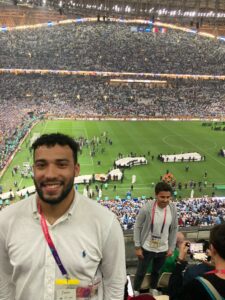Qatar 2022: A Journalist’s Perspective
Jay Harris from The Athletic speaks to the Sports Gazette about his experience of the 2022 FIFA World Cup.

The 2022 FIFA World Cup was, for lack of a better word, weird. Hosted in winter instead of occupying the usual summer break period, Qatar 2022 was a tournament like no other.
Fans marvelled at some of the most spectacular games of football we’ve ever seen; the iconic final between Argentina and France was a fitting way to round off a tournament that, for many, was one of the greatest ever.
The reasons for that sentiment, though, pertain to events occurring on the pitch.
Off the pitch, FIFA’s latest offering of a month-long feast of international football brought with it politics, debate, and controversy.
As such, the journalists on the ground in Doha had the delicate task of covering a World Cup completely enveloped by the aforementioned issues, but also packed to the brim with moments of footballing significance fit for the sport’s annals.
What was it like to cover Qatar 2022?
“Going to a World Cup is something I’d wanted to do since I was six-years old. I don’t want to deny the fact that it was a lifelong dream of mine,” The Athletic’s, Jay Harris, told the Sports Gazette.
“Every year, I write a goals list of what I want to achieve by the end of the year, and I’ve also got a separate list of stuff I want to achieve in the rest of my life,” Harris said, looking up at the wall that he’d pinned his list to.
“At the top of both is to report at a World Cup. I can remember always putting it on my CVs and cover letters when I was applying for jobs.”
Harris and his colleagues were, however, not in Qatar to enjoy the World Cup in the same way a fan would, but rather to experience it through an occupational lens.
He spoke of some gruelling days in which he went to press conferences and training sessions, recorded podcasts, wrote match reports, and then potentially only had two hours sleep in between match days.

“There are moments where it does feel like work, but then you stand up and think, ‘wow, I’ve just witnessed Kylian Mbappe equalise and I get an extra 30 minutes of the World Cup final,’” he said.
Those who were able to watch these games unfold were lucky, and Harris spoke of the diversity amongst the crowds with fondness.
“I saw so many people that had a similar skin tone to me, and that’s quite rare at football matches, especially in the UK and Europe. When I went to watch Argentina vs Australia, the number of fans I’d spoken to who’d come from India, Bangladesh, Nepal – I’m not too sure if they would have ever had an opportunity to go to a World Cup if it wasn’t held in the Middle East,” he said.
Yes, FIFA’s decision to allow Qatar to host this World Cup meant that it was accessible for people whom it hadn’t been accessible to in the past. But the inclusivity stopped there.
“It’s also about constantly reminding yourself and not forgetting that there are people here that feel extremely uncomfortable,” Harris said.
FIFA and the Qatari regime were under the spotlight for a variety of reasons: the stance against the LGBTQ+ community, the records about deaths of migrant workers, the superfluous draping of a Bisht onto Lionel Messi before he lifted the trophy. The list could go on.
But despite FIFA’s efforts to confine any musings of a political flavour to off-air discussions, Harris and The Athletic were compelled by obligation to talk about everything at this World Cup.
“Infantino and FIFA sent out an email a month or two before the tournament started talking about how now is the time to start focusing on football,” said Harris.
“But I’m fortunate to work for The Athletic, and feel empowered by colleagues and my editors to make sure that we write a story no matter who we’re going to piss off. Sometimes that’s the best form of journalism.”
Harris and his colleagues were extremely vocal in their critique of the Qatari regime throughout the tournament. Adam Crafton – one of the few openly gay journalists who attended the World Cup – has written several articles that leave an unsavoury taste upon reading.
When asked about whether he had any conflicting emotions about covering the World Cup knowing that some of his colleagues were not welcome in Qatar, Harris said:
“What I told myself was, ‘if I’m going to go out there, I have to do both.’ You have to work for an institution that is going to do both.
“We can’t just focus on Netherlands vs Argentina descending into some sort of riot on the pitch. You’ve got to make sure that you’re constantly talking about the migrant worker issues or the LGBTQ+ issues. You go over there, and yes, you’re excited for the football matches, but you know that can’t be your only focus.”
Another element in Harris’ focus was the lack of football culture in Qatar.
“It was difficult to determine if Qatar had any kind of football culture.
“There were a lot of games where it looked like Qataris only turned up ten or 15 minutes into the game, and would then leave early. So, in terms of how engaged they’d become with this sport that their country had spent millions of pounds on… it’s difficult to guess,” he said.
The football culture of a host country would be something you’d relish to indulge in at a World Cup. But more than that, it points to another issue that was highlighted on The Athletic Football Podcast: Qatar 2022’s legacy.
“What’s basically happened is that there’s been a party in Qatar for four or five weeks and then everything’s gone back to normal.
“What football team in Qatar is going to fill that stadium? The answer is, no one,” Harris said.
It seems as though the legacy of this World Cup will be fabulous football, and nothing else. It hasn’t captured the souls and minds of the host nation; it hasn’t quashed any slanderous rhetoric about the Qatari regime and FIFA (in fact, it’s done the complete opposite); it hasn’t eclipsed the return of club football in any way at all.
And now the party is over and the sun has set on this World Cup, all that is left in Doha are these huge, super-modern stadia destined to become ‘White Elephant’ stadia. The migrant workers who lost their lives building those stadia did so for what? Fabulous football? For a month?
The looming question then, is whether FIFA would consider bringing the World Cup to more countries with dubious human rights records?
“FIFA have routinely shown that they’re willing to bend the rules,” Harris said.
“If they do decide to host a tournament in a country that has a lot of socio-political issues, the backlash and the scrutiny would be even more intense. If that did happen, people would feel helpless.”
You have to question whether the Qatari regime are sitting in their palaces scratching their heads at the fact they’ve spent billions on a tournament that’s brought them nothing but unrelenting criticism.
Today, perhaps Gianni Infantino feels happy that football was talked about and that it did produce some stunning storylines.
But, thanks to Harris and the other journalists who made the trip to Qatar, his plea to keep the discussions purely football-based will fall on deaf ears – and rightly so.